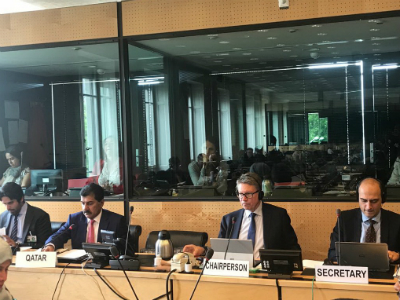Qatar Discusses Its Third Periodic Report before Committee against Torture

Geneva / Information Office / May 02
The State of Qatar discussed the third periodic report before the 63rd session of the Committee against Torture in Geneva, under the Convention against Torture and Other Cruel, Inhuman or Degrading Treatment or Punishment.
HE Secretary-General of the Ministry of Foreign Affairs Dr. Ahmed bin Hassan Al Hammadi headed Qatar's delegation which included representatives from the Ministry of the Interior, the Public Prosecution, the Ministry of Justice, the Ministry of Public Health, the Ministry of Administrative Development, Labor and Social Affairs and the Ministry of Education and Higher Education.
Addressing the Committee, HE Secretary-General of the Ministry of Foreign Affairs Dr. Ahmed bin Hassan Al Hammadi said that the State of Qatar considers this interactive dialogue as a process that contributes to enhancing the mutual understanding with the Committee in order to promote human rights and establish the foundations of justice.
HE Al Hammadi added that the State of Qatar also considers the process of discussing the reports by the Monitoring Committees as a valuable opportunity to develop performance and properly analyze its positions on human rights issues as a whole.
HE the Secretary-General of the Ministry of Foreign Affairs noted that the report presented to the Committee is the result of coordination, consultation and cooperation among all concerned parties in the State, in accordance with the guidelines issued by the Committee in this regard.
He stressed the great importance attached by the State of Qatar to complying with the Convention against Torture in all its criminal laws prohibiting torture and criminalizing it in clear and comprehensive terms.
The State of Qatar applies the provisions of the Convention at the national level through a number of means, including the Permanent Constitution of the State of Qatar, which decisively criminalizes torture, and the Qatari Penal Code and other legislation prohibiting all forms of torture, as well as the independent country judicial system which provides a general mechanism to monitor the application of such legislation, and other administrative mechanisms available with specific powers to receive and investigate complaints against law enforcement personnel, he said.
His Excellency said that the Government of Qatar is committed to protecting persons at risk of torture, and against regimes that violate fundamental freedoms and practice torture, stressing that Qatar continues to fulfill its obligations under the Convention.
From the date of the discussion of its second report in 2012 to the submission of its third report in 2016, the State of Qatar witnessed extensive legislative and institutional developments with regard to human rights, he noted.
Since the submission of its third periodic report in December 2016 to date, the State of Qatar has taken considerable steps towards strengthening the institutional structures of human rights at the legislative and regulatory levels and at the level of policies, strategies and international cooperation, including the approval by the Council of Ministers of Qatar's accession to the International Covenant on Civil and Political Rights and the International Covenant on Economic, Social and Cultural Rights, thereby becoming a party to seven core international human rights treaties, HE the Secretary-General of the Ministry of Foreign Affairs added.
HE Dr. Ahmed bin Hassan Al Hammadi referred to the State's fundamental legislative reforms aimed at supporting the legal protection of migrant workers, guaranteeing their rights and enabling them to obtain legal redress by regulating the entry and exit of expatriates and their residence, and abolishing the sponsorship system.
Meanwhile, HE the Secretary-General of the Ministry of Foreign Affairs noted the unilateral coercive measures against the State of Qatar and the unjust siege imposed by some countries in the region and its consequent serious and continuing violations of human rights, referring in this regard to the official letters sent by a number of special rapporteurs of the Human Rights Council to the siege countries, and the report issued by the Technical Mission of the Office of the High Commissioner for Human Rights after its visit to the State of Qatar, which confirmed grave violations of human rights committed by the siege countries against the citizens and residents of Qatar.
Concluding, HE the Secretary-General of the Ministry of Foreign Affairs stressed Qatar's firm position in support of the protection and promotion of human rights, the implementation of the provisions of all international conventions, including the Convention against Torture, and the continuation of its efforts through its membership in regional and international organizations to contribute actively to efforts to promote and protect human rights.

